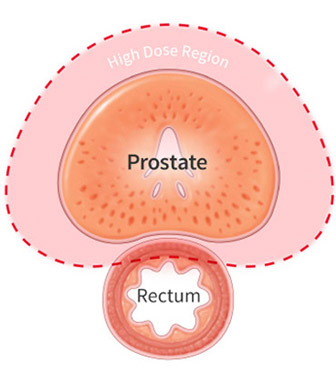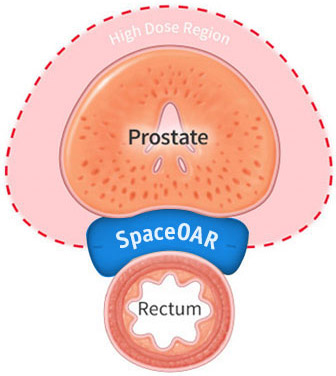Find out more about SpaceOAR Hydrogel
![]()
![]()
![]()
SpaceOAR Hydrogel is intended to temporarily move the rectal wall away from the prostate during the course of radiotherapy treatment for prostate cancer, and in creating this space it is the intent of SpaceOAR Hydrogel to reduce the radiation dose affecting the rectum.
SpaceOAR Hydrogel contains polyethylene glycol (PEG). As with any medical treatment, there are some risks involved with the use of SpaceOAR Hydrogel. Potential complications associated with SpaceOAR Hydrogel include, but are not limited to: pain associated with injection, pain or discomfort from the hydrogel, site inflammation, infection (including abscess), inability to urinate, urgent need to urinate, constipation, rectal muscle spasm, damage to lining of rectum, ulcers, fistula (a hole between rectum and bladder, urethra, or skin below the scrotum), perforation (hole in prostate, bladder, urethra, rectum), necrosis (dead tissue), allergic reaction (local reaction or more severe reaction, such as anaphylaxis), embolism (blood vessel blockage is possible and may happen outside of the pelvis, potentially impacting vital organs or legs), fainting, and bleeding. Please talk to your doctor about the risks and benefits related to using SpaceOAR Hydrogel. If one or more of these complications occur, you may need medical treatment or surgery. URO-1288805-AA APR 2022
CAUTION: The law restricts these devices to sale by or on the order of a physician. Indications, contraindications, warnings and instructions for use can be found in the product labeling supplied with each device. Information for use only in countries with applicable health authority registrations. This material not intended for use in France.
Products shown for INFORMATION purposes only and may not be approved or for sale in certain countries.
References
- Mariados N, Sylvester J, Shah D, et al. Hydrogel spacer prospective multicenter randomized controlled pivotal trial: Dosimetric and clinical effects of perirectal spacer application in men undergoing prostate image guided intensity modulated radiation therapy. Int J Radiat Oncol Biol Phys. 2015 Aug 1;92(5):971-7.
- Hamstra DA, Mariados N, Sylvester J, et al. Continued benefit to rectal separation for prostate radiation therapy: Final results of a phase III trial. Int J Radiat Oncol Biol Phys. 2017 Apr 1;97(5):976-85.
- Karsh LI, Gross ET, Pieczonka CM, et al. Absorbable hydrogel spacer use in prostate radiotherapy: A comprehensive review of phase 3 clinical trial published data. Urology. 2018 May;115:39-44.







